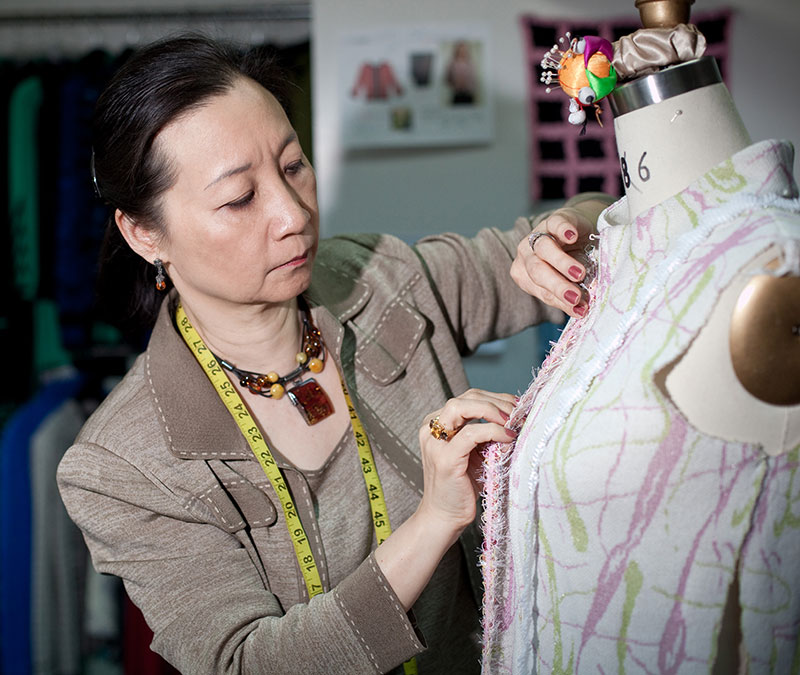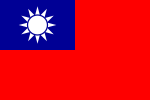Immigrant Entrepreneur: Eddie and Ming Wang | Country of Origin: Taiwan | Emigrated to U.S.: 1978 | Launched Ming Wang: 1986 | Annual Revenue: $15M | Jobs Created: 40
Taiwanese immigrants Eddie and Ming Wang started their business from a kitchen table. Now it’s a $12 million enterprise.
When Taiwanese immigrants Eddie Wang spent $600 from his savings to buy a knitting machine, he didn’t realize the decision would change the course of his life. But, unexpectedly, that investment in 1978 paved the way for Eddie and his wife, Ming, to create a multimillion-dollar, international fashion business, Toula. Today the company is thriving, reporting 2010 sales of $15 million and selling its line of clothing in 350 retailers across the U.S., including Saks Fifth Avenue, Nordstrom and Dillard’s.
“We came to the U.S. as foreigners and started from nothing,” says Wang. “The U.S. is the only country that it can be done this way.”
Here’s their story:
Getting Started in the US
Eddie and Ming Wang, along with their infant son, came to New York From Taiwan in 1978. Both parents had been accepted to study at the Fashion Institute of Technology (FIT) in New York.
Once settled in New York, the Wangs quickly had to find a way of supporting themselves. They had plowed through their meager savings and were determined not to ask their parents back in Taiwan for help.
Through contacts at FIT they learned it was possible to earn money doing contract knitting work from home. It seemed to be an ideal solution. When not in class, Ming could work from home while, looking after their infant son. With that, Eddie and Ming bought a knitting machine for $600, got a contract from a designer they had met at FIT, and started producing knitwear from their small apartment in Corona, Queens.
Things didn’t go smoothly at first. Not long after Ming started knitting, she injured her arm on the machine. “It hurt her very badly,” Eddie recalls. “I had to massage it at night.” They also learned quickly that that Ming couldn’t earn enough on her own to support the family. Instead of giving up, the couple bought another knitting machine so both of them could work at night. “We worked six nights and days a week,” Eddie recalls. Even with both of them working, they struggled. “We had a really hard time,” he says. “Ming was counting the money every day to buy food.”
Building the Business Door-to-Door
Eddie and Ming realized they needed to generate more money, and quickly. They simply had to get more contracts. Not sure how to go about it, Wang reached out to his yarn suppliers for leads to manufacturers. “I used my common sense,” he says. “I said, `Yarn suppliers will know who I need to talk to.’” They advised him to contact a group of clothing designers based in a building on New York’s Seventh Avenue.
“I used my common sense,” he says. “I said, `Yarn suppliers will know who I need to talk to.'”
Eddie took his samples and starting on the ground floor, made door-to-door sales calls on every design house in the building. His sales pitch was simple. “I said, ‘If you have a knitwear line, I can produce it cheaper and better quality than who you’re currently using'”. The Wangs’ first sizable contract came from Richtone, a large knitwear designer. More orders from Richtone and other designers quickly followed.
Read Eddie Wang’s advice on selling
Eddie Wang made door-to-door sales calls on every design house in the building.
With more work, the Wangs started hiring. Their apartment in Queens was overflowing with knitting machines and knitters. Even the baby’s room was producing sweaters and two pieces. Very quickly Eddie and Ming realized that they had to move their business into a larger space.
They rented space in a six floor factory building in Long Island City, hired employees and bought knitting machines. Within 24 months, the Wangs had built one of the largest contract knitwear companies in New York and owned the factory building outright.
Evolving from Contracting to Manufacturing
Looking to expand on the contracting business, the Wangs decided to take the leap into manufacturing their own designs under a knitwear line called Toula. Ming had been designing her own line of clothing while building the contracting business with her husband.
They moved to Miami to set it up in 1986, a time when garment manufacturing was growing in that part of the country. “I saw the trend,” Wang says. The lower cost of living in Florida also enabled them to move into a bigger home. “New York is very crowded and expensive,” says Wang. They also loved Florida’s weather. “It’s very similar to Taiwan,” he says.
Setbacks
Unfortunately, the couple hadn’t researched all of nuances of manufacturing. “We didn’t know that in manufacturing, you’re involved in finance, credit and inventory,” Wang recalls. “I didn’t have the basic foundation to do that kind of business.” Although Toula’s sales grew quickly, the company wasn’t profitable.
“We didn’t know that in manufacturing, you’re involved in finance, credit and inventory.”
Despite the business struggling, the couple paid careful attention to building a stellar reputation with their business contacts, in keeping with their Chinese upbringing. “My parents instilled a lot of Confucian ideals into me,” says Wang. “We always say, ‘In everything you do, you must be honest.’ Even if we didn’t make money in the beginning, we always paid our bills. We paid our vendors and the help.” After Wang learned how to manage accounts receivable and inventory, the business began turning a profit in the early ’90s.
“We always say, ‘In everything you do, you must be honest.’ Even if we didn’t make money in the beginning, we always paid our bills.”
Launching a Second Line
Getting feedback from retailers that some shoppers found Toula’s clothes too heavy, the Wangs launched a second line of lighter-weight clothing in 1999 called Ming Wang Knits. The line took off quickly. “We sold to the same retailer base,” he says. “They could carry both lines in the same store.”
“In 2006, the company moved production to China to reduce its overhead.” Bringing in $10 million to $15 million annually, it has become a top knitwear manufacturer in the US. Currently, it has about 40 employees in the US, with its headquarters in Dallas and a showroom in New York City. In China, it employs another 250 to 300 people. The Wangs now have several homes around the world, so they can manage their diverse operations.


